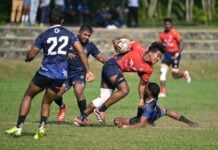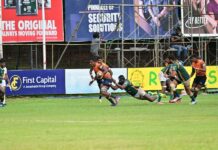The try that ended up being the match winning try scored by Navy SC in their game against CR&FC at Longdon Place had a few issues with it.
The incident took place in the 2nd half of the game which is embed below and the incident is at 5.14pm on the time stamp in the video.
Lutumailagi who is on the field for Navy picks up the loose ball close to his own 40m line and hacks it down the field. Dhanushka Pushpakumara has come up in defence and there is nobody back for CR. Nissan Atui and Murad Ramzin, a no.8 and a hooker, do their best to get back for the home team. Naturally, the Fiji sevens winger gets to the ball, but at his blistering pace overruns it slightly. Nissan, does well to fall on the ball and the loose ball squirts out from under him, with Lutumailagi stranded upfield.
The referee deems this squirt to be a knock on, and arriving rather late, puts his hand up and blows the whistle to stop play. Dinusha Chaturanga – the Navy winger – who was chasing up as good wingers do, put his boot to the loose ball which bounced towards the right corner flag patrolled by Assistant Referee Priyantha Gunaratne.
Chaturanga is chased by Ramzin who was never going to get close, and he controlled it well before falling on the ball. He didn’t hear the whistle which had gone off four seconds earlier. Now referee Rankothge had blown his whistle and it is beyond any doubt that play had stopped and Chaturanga touched ball down during this stoppage. There is no argument on that fact, and there cannot be one. The whistle goes, and play stops according to Law 6.A.7 (b) and (d) in the IRB Rules.
Once play has stopped, it is unfortunate that scoring happens. But you see it in football all the time, where players don’t see the offside flag or hear the ref’s whistle and go on to score a goal. Even if the decision was right or wrong, if the whistle had blown, the ref can’t allow the goal. But Rankothge and Gunaratne departed from that common sense position and awarded a try that had been scored after play had been stopped.
The try should never have been awarded. This is made all the worse, as the referee cannot consult his assistant on matters such as this. Furthermore, according to law 6.A.5, the ref’s decision can only be changed in two specific instances, where a) the ball was in touch, or b) where foul play had occurred. Neither of these two situations existed. He cannot alter the decision to call for the scrum.
In the end the difference between the sides was 4 points. CR were undone by a terrible bit of officiating. These decisions are not the usual ones where you may miss a knock on or a forward pass, or let a few things go at the breakdown. This was a clear violation of all protocols and common sense.

















